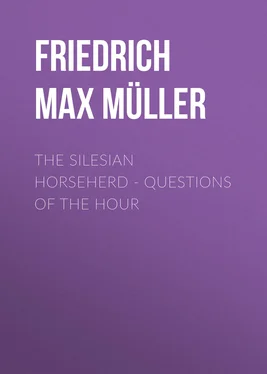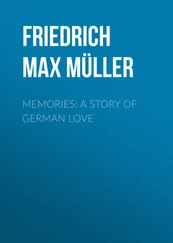Friedrich Max Müller - The Silesian Horseherd. Questions of the Hour
Здесь есть возможность читать онлайн «Friedrich Max Müller - The Silesian Horseherd. Questions of the Hour» — ознакомительный отрывок электронной книги совершенно бесплатно, а после прочтения отрывка купить полную версию. В некоторых случаях можно слушать аудио, скачать через торрент в формате fb2 и присутствует краткое содержание. Жанр: foreign_prose, foreign_religion, Философия, foreign_psychology, foreign_antique, на английском языке. Описание произведения, (предисловие) а так же отзывы посетителей доступны на портале библиотеки ЛибКат.
- Название:The Silesian Horseherd. Questions of the Hour
- Автор:
- Жанр:
- Год:неизвестен
- ISBN:нет данных
- Рейтинг книги:4 / 5. Голосов: 1
-
Избранное:Добавить в избранное
- Отзывы:
-
Ваша оценка:
- 80
- 1
- 2
- 3
- 4
- 5
The Silesian Horseherd. Questions of the Hour: краткое содержание, описание и аннотация
Предлагаем к чтению аннотацию, описание, краткое содержание или предисловие (зависит от того, что написал сам автор книги «The Silesian Horseherd. Questions of the Hour»). Если вы не нашли необходимую информацию о книге — напишите в комментариях, мы постараемся отыскать её.
The Silesian Horseherd. Questions of the Hour — читать онлайн ознакомительный отрывок
Ниже представлен текст книги, разбитый по страницам. Система сохранения места последней прочитанной страницы, позволяет с удобством читать онлайн бесплатно книгу «The Silesian Horseherd. Questions of the Hour», без необходимости каждый раз заново искать на чём Вы остановились. Поставьте закладку, и сможете в любой момент перейти на страницу, на которой закончили чтение.
Интервал:
Закладка:
How came it, then, that cultured men in high stations, entirely independent, professed Christianity? How did they make their friends and former co-believers understand that such a step was bona fide ? In answering this question, we get help from Celsus, as well as his opponent, Origen.
The bridge which led across from Greek philosophy to Christianity was the Logos. It is remarkable how much this fundamental doctrine of Christianity fell, later on, into the background; how little it is understood, even by the educated of our own time, and how often, without giving it any consideration, they have cast it aside. In early Christian days this was probably a consequence of the practical and political development of the new religion. But the living nerve of the Christian religion, which was its closest bond to the highest spiritual acquisitions of the ancient Greek world, was thus severed. First, the Logos, the Word, the Son of God, was misunderstood, and mythology was employed to make the dogma, thus misconceived, intelligible. In modern times, through continued neglect of the Logos doctrine, the strongest support of Christianity has been cut from under its feet, and at the same time its historical justification, its living connection with Greek antiquity, has almost entirely passed out of view. In Germany it almost appears as though Goethe, by his Faust , is answerable for the widespread treatment of the Logos idea as something obscure, incomprehensible, mystical. Many, when reading the opening of the Fourth Gospel, “In the beginning was the Word,” say to themselves, “No one understands that,” and read on. He who does not earnestly and honestly make an effort to understand this beginning of the Gospel, shows that he is but little concerned with the innermost essence of Christianity, as clearly presented to us in the Fourth Gospel. He forgets that not only faith, but thought, pertains to a religion. It is no excuse to say, “Did not the learned Dr. Faust torment himself to discover what ‘the word’ here meant, and did not find it out?” He says in Goethe:—
“'Tis writ: ‘In the beginning was the Word’!
I pause perplexed! Who now will help afford?
I cannot the mere Word so highly prize,
I must translate it otherwise.”
But this is just what he ought not do. It was not necessary to translate it at all; he only needed to accept the Logos as a technical expression of Greek philosophy. He would then have seen that it is impossible to prize the Word too highly, if we first learn what the Word meant in the idiom of contemporary philosophy. Not even to a Faust should Goethe have imputed such ignorance as when he continues to speculate without any historical knowledge:—
“If by the spirit guided as I read,
“In the beginning was the Sense,” Take heed.
The import of this primal sentence weigh,
Lest thy too hasty pen be led astray.
Is force creative then of sense the dower?
“In the beginning was the Power.”
Thus should it stand; yet, while the line I trace,
A something warns me once more to efface.
The spirit aids, from anxious scruples freed,
I write: ‘In the beginning was the Deed.’ ” 11 11 Miss Swanwick's translation.
Had Goethe wished to scourge the unhistorical exegesis of modern theologians, he could not have done so better than by this attempt of an interpreter of the Bible, fancying himself illumined by the spirit, but utterly destitute of all knowledge of history. Knowledge of the history of the Greek philosophy of the first and second centuries after Christ is indispensable to the understanding of such a word as Logos—a word that grew up on Greek soil, and whose first roots reach far into the distant past of the Greek mind; and for that very reason not admitting of translation, either into Hebrew or into German. Like many other termini technici , it must be understood historically; just as logic, metaphysic, analytic, organon, etc., can only be apprehended and understood historically. Now it is, perhaps, not to be denied, that even now a majority of educated readers either perfunctorily repeat the first sentence of the Fourth Gospel, “In the beginning was the Word,” or believe that something lies buried therein that is beyond the depth of ordinary men. This, of course, is partially true, and it cannot be otherwise in religions which are intended not only for the young, but for the wise and learned, and which should be strong meat for adults, and not merely milk for babes. The fault lies chiefly in the translation, in that it should have been thought necessary to translate a word instead of permitting it to remain, what it was, a foreign word.
This becomes still worse when, as for instance, in certain Oriental languages, the newly converted Christian has to read, “In the beginning was the Noun or the Verb.” The correct translation would, of course, be, “In the beginning was the Logos.” For Logos is not here the usual word Logos, but a terminus technicus , that can no more be translated out of the lexicon than one would think of etymologically translating Messiah or Christ as the “Anointed,” or Angelos as “messenger” or “nuncio.” If we read at the beginning of the Gospel, “In the beginning was the Logos,” at least every one would know that he has to deal with a foreign, a Greek word, and that he must gain an understanding of it out of Greek philosophy, just as with such words as atom , idea , cosmos , etc. It is remarkable what human reason will consent to. Millions of Christians hear and read, “In the beginning was the Word,” and either give it no thought, or imagine the most inconceivable things, and then read on, after they have simply thrown away the key to the Fourth Gospel. That thought and reflection also are a divine service is only too readily forgotten. Repeated reading and reflection are necessary to make the first verse of the Fourth Gospel accessible and intelligible in a general way; but one cannot be a true Christian without thinking and reflecting.
An explanation of Logos in Greek philosophy is much simpler than is commonly supposed. It is only needful not to forget that for the Greeks thought and word were inseparable, and that the same term, namely, Logos, expressed both, though they distinguished the inner from the outer Logos. It is one of the most remarkable aberrations of the human mind, to imagine that there could be a word without thought or a thought without word. The two are inseparable: one cannot exist or be even conceived without the other. I believe that I have clearly shown in my Science of Thought that thought without word and word without thought are impossible and inconceivable, and why it is so. Here is the first key to a historical solution of the riddle at the beginning of the Fourth Gospel. We know that Greek philosophy after making every possible effort to explain the world mechanically, had already in the school of Anaxagoras reached the view that the hylozoic as well as the atomic theory leaves the human mind unsatisfied; and that it is necessary to posit as the origin of all things a thought or thinking mind that manifests itself in the universe. This was the nous , the mind, of Anaxagoras. He could just as well have called it Logos , for the word was in use even before the time of Anaxagoras, to express that reason, the recognition of whose all-pervading presence in the universe was the great step in advance made by the system of Anaxagoras. Even Heraclitus had divined the existence of reason in the universe, and had applied to it the name Logos. While the masses recognised in Moira or Heimarmenê only destiny, or fate, Heraclitus declared, that the essence of this Heimarmenê is the Logos , the Reason that pervades the world. This is the oldest expression of Hegel's thought, “What is, is rational.” We must not suppose, however, that Heraclitus considered this Logos as identical with his fire. He merely says that the fire is subordinate to the Logos, that it operates κατὰ τὸν λόγον, according to the Logos, or (as we should say) rationally.
Читать дальшеИнтервал:
Закладка:
Похожие книги на «The Silesian Horseherd. Questions of the Hour»
Представляем Вашему вниманию похожие книги на «The Silesian Horseherd. Questions of the Hour» списком для выбора. Мы отобрали схожую по названию и смыслу литературу в надежде предоставить читателям больше вариантов отыскать новые, интересные, ещё непрочитанные произведения.
Обсуждение, отзывы о книге «The Silesian Horseherd. Questions of the Hour» и просто собственные мнения читателей. Оставьте ваши комментарии, напишите, что Вы думаете о произведении, его смысле или главных героях. Укажите что конкретно понравилось, а что нет, и почему Вы так считаете.












